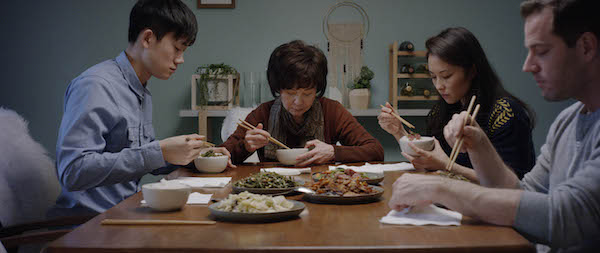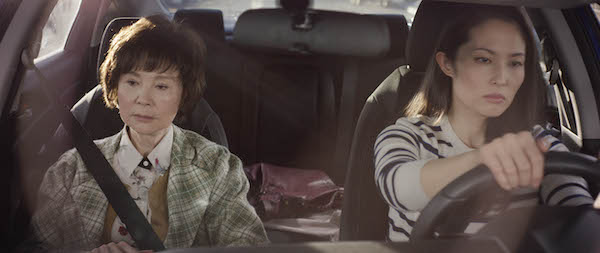Sensitive to a fault, Beneath the Banyan Tree explores an uprooted Chinese family trying to find its way in Los Angeles. Anchored by strong performances, the movie overcomes script and pacing problems to reach emotional moments that will resonate with sympathetic viewers.
Written and directed by Nani Li Yang, Banyan focuses at first on Ai-Jia (Kathy Wu), a struggling writer who earns a living leading sightseeing tours for Chinese. In a comfortable relationship with Vance (Travis Goodman), an animator, she’s thrown out of balance when she learns her brother and sister-in-law have been jailed on corruption charges in mainland China.
That means Ai-Jia has to take care of their children, rebellious teen Sheng-Qi (Demi Zijing Ke) and her shy, withdrawn brother Sheng-Yu (Jiayu Wang). They arrive in LA with Ai-Jia’s mother Jia-Rong Woo (Ah-Leh Chang Gua), a stern matriarch who doesn’t know anything about Vance. He’s not the only secret that will come to light as the characters try to adjust to new surroundings.
Much of Banyan concentrates on the day-to-day lives of its characters. Conflicts and complications multiply when the children enter school. Woo meets up with Tsiu (Ying Xie), an acquaintance from China prone to gossip, and starts visiting a senior community center. Vance stays in the background, confused about a dynamic unfolding in a language he doesn’t understand.
Given the film’s limited budget, director Li Yang handles the various storylines with an assured hand. Ai-Jia’s problems feel honest enough, and her inability or unwillingness to explain herself to her mother gives their scenes a surprising depth.
That’s partly due to two exceptional performances, partly to Li Yang’s light hand as a director. Edwin Beckenbach’s cinematography is a huge factor as well. He finds ways to bring out the best in the somewhat bland production design. Beckenbach’s extreme close-ups are something else, at times pushing the narrative forward almost singlehandedly. The shots of Qi are exquisitely beautiful, as are the tight, isolated shots of Yu with his classmate Raymond (Scott Felix).
Banyan reaches its emotional peaks in the scenes between Woo and Ai Jia. As played by the screen veteran Gua, Woo can be simultaneously steely and vulnerable. Past disappointments can be seen in her formal posture, her forbearance, the way she looks at the people around her. As much as she tries to deny it, Ai-Jia has the same traits. Kathy Wu does a superb job detailing Ai-Jia’s growing realization that she is very much like her mother. Both performers are wonderful.
The other storylines are more predictable and less persuasive. Qi is taken in by a smooth-talking student, Yu tries to repress his sexual urges, and both are pressured to live up to ideals they may not accept. These problems just aren’t very original, no matter how carefully Li Yang stages them.
Yes, Banyan has problems, some due to the budget, others to the script. Still, there is a commitment here that makes the movie compelling even when it occasionally sputters. That’s largely due to Li Yang’s sympathetic approach to the characters, and to a cast and crew that takes their work seriously.
BENEATH THE BANYAN TREE opened in North America on 3/15/2022. Platforms include: AT&T U-Verse, DirecTV, Dish Network, Sling TV. Also Amazon, iTunes, Vudu, Xbox, Google Play, YouTube Movies. The DVD is available via Amazon.com, Bestbuy.com, Walmart.com, and Barnesandnoble.com.




